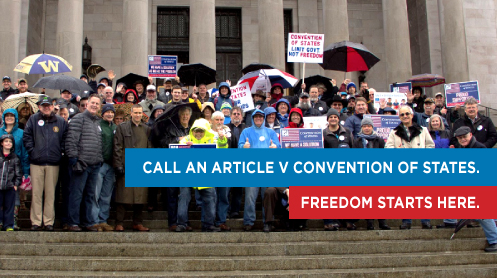How is a convention convened once
". . . the Application of the Legislatures of two thirds of the several States, shall call a Convention for proposing Amendments . . . " is made?
You never answered my question. Do you support the
Fair Share Balanced Budget Amendment?
The Balanced Budget Amendment you support
H. J. RES. 17, if adopted would make it constitutional for Congress to not balance the annual budget, and allow Congress to continue to add to the national debt year, after year.
By contrast, the
Fair Share Balanced Budget Amendment does in fact end Congress adding to the national debt, by requiring any borrowing to meet expenses during the course of a fiscal year, to be immediately extinguished by an apportioned direct tax, and is our Founder's intended procedure to deal with such deficiencies.
Here is the latest text of the Fair Share Balanced Budget Amendment with editorial comments.
“SECTION 1. The Sixteenth Amendment is hereby repealed and Congress is henceforth forbidden to lay any tax or burden calculated from profits, gains, sales, interest, salaries, wages, tips, inheritances or any other lawfully realized money.
NOTE: these words would return us to our Constitution’s original tax plan as our Founders’ intended it to operate! They would also end the experiment with allowing Congress to lay and collect taxes calculated from lawfully earned “incomes” which now oppresses America‘s economic engine and robs the bread which working people have earned when selling the property each has in their own labor, not to mention the amendment would end federal taxation being used as a political weapon to harass and attack political opponents!
“SECTION 2. Congress ought not raise money by borrowing, but when the money arising from imposts duties and excise taxes are insufficient to meet the public exigencies, and Congress has raised money by borrowing during the course of a fiscal year, Congress shall then lay a direct tax at the beginning of the next fiscal year for an amount sufficient to extinguish the preceding fiscal year’s deficit, and apply the revenue so raised to extinguishing said deficit.”
NOTE: Congress is to raise its primary revenue from imposts and duties, [taxes at our water’s edge], and may also lay miscellaneous internal excise taxes on specifically chosen articles of consumption [preferably articles of luxury]. But if Congress borrows and spends more than is brought in from imposts, duties and miscellaneous excise taxes during the course of a fiscal year, then, and only then, is the direct apportioned tax to be laid in order to balance the budget on an annual basis.
“SECTION 3. When Congress is required to lay a direct tax in accordance with Section 1 of this Article, the Secretary of the United States Treasury shall, in a timely manner, calculate each State’s apportioned share of the total sum being raised by the agreed upon apportionment formula found in our Constitution, and then provide the various State Congressional Delegations with a Bill notifying their State’s Executive and Legislature of its share of the total tax being collected as done on July 14th, 1798 LINK (at the link enter 62 in the box at the top of the page and then press enter on your keyboare), and a final date by which said tax shall be paid into the United States Treasury.”
NOTE: our founder’s fair share formula to extinguish an annual deficit is:
States’ population
---------------------------- X SUM TO BE RAISED = STATE’S FAIR SHARE OF DIRECT TAX
Total U.S. Population
The above formula, as intended by our founding fathers, is to ensure that each state’s share towards extinguishing an annual deficit is proportionately equal to its representation in Congress, i.e., representation with a proportional financial obligation! And if the tax is laid directly upon the people by Congress, then every taxpayer across the United States would pay the exact same amount!
Note also that each State’s number or Representatives, under our Constitution is likewise determined by the rule of apportionment:
State`s Pop.
------------------- X House size (435) = State`s No. of Representatives
U.S. Pop.
“SECTION 4. Each State shall be free to assume and pay its quota of the direct tax into the United States Treasury by a final date set by Congress, but if any State shall refuse or neglect to pay its quota, then Congress shall send forth its officers to assess and levy such State’s proportion against the real property within the State with interest thereon at the rate of ((?)) per cent per annum, and against the individual owners of the taxable property. Provision shall be made for a 15% discount for those States paying their share by ((?))of the fiscal year in which the tax is laid, and a 10% discount for States paying by the final date set by Congress, such discount being to defray the States’ cost of collection.”
NOTE: This section respects the Tenth Amendment and allows each state to raise its share in its own chosen way in a time period set by Congress, but also allows the federal government to enter a state and collect the tax if a state is delinquent in meeting its obligation.
"SECTION 5. This Amendment to the Constitution, when ratified by the required number of States, shall take effect no later than (?) years after the required number of States have ratified it.
Do you support the Fair Share Balanced Budget Amendment? JWK
"In matters of power let no more be heard of confidence in men, but bind him down from mischief by the chains of the Constitution. … "Thomas Jefferson’s Fair Copy of the Kentucky Resolutions of 1798

